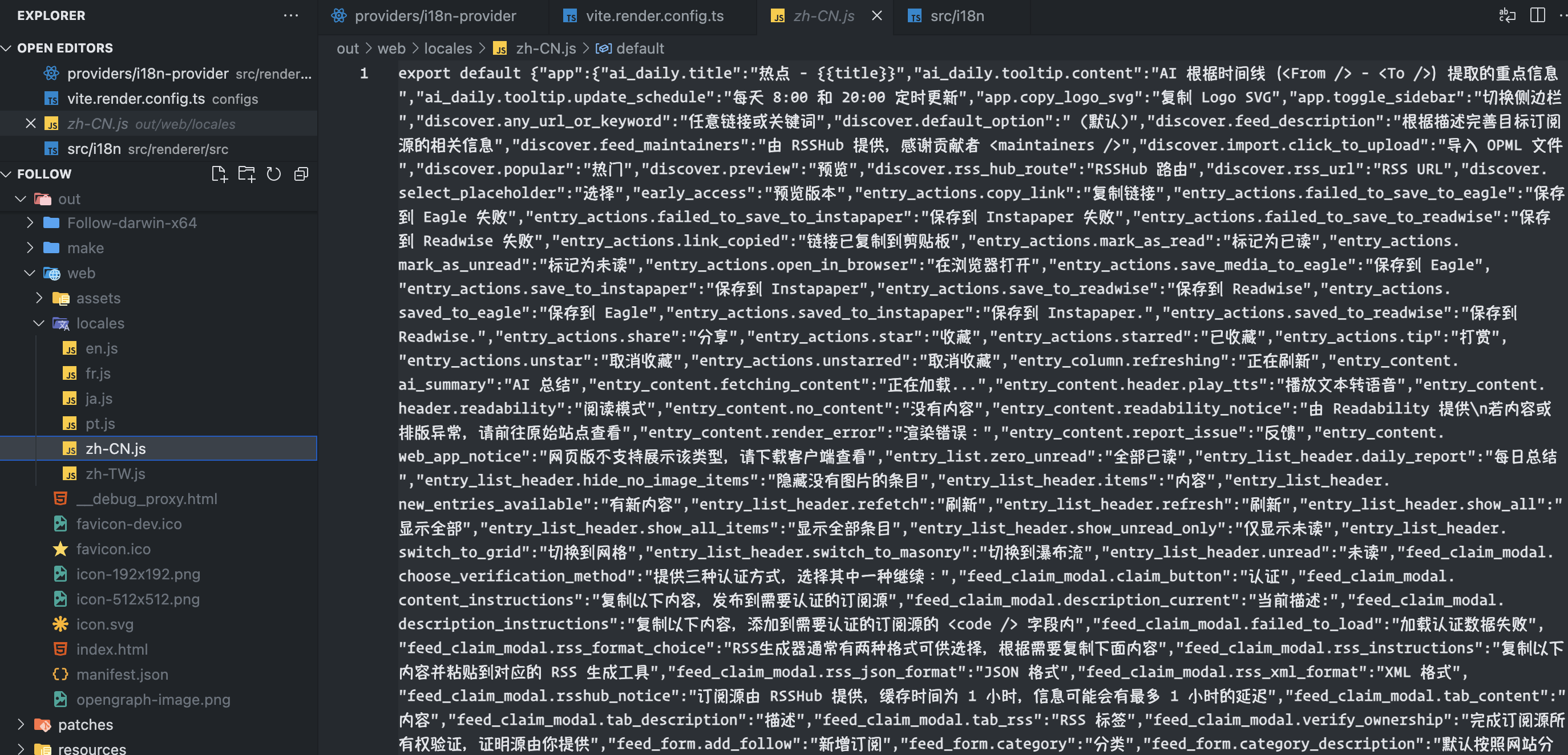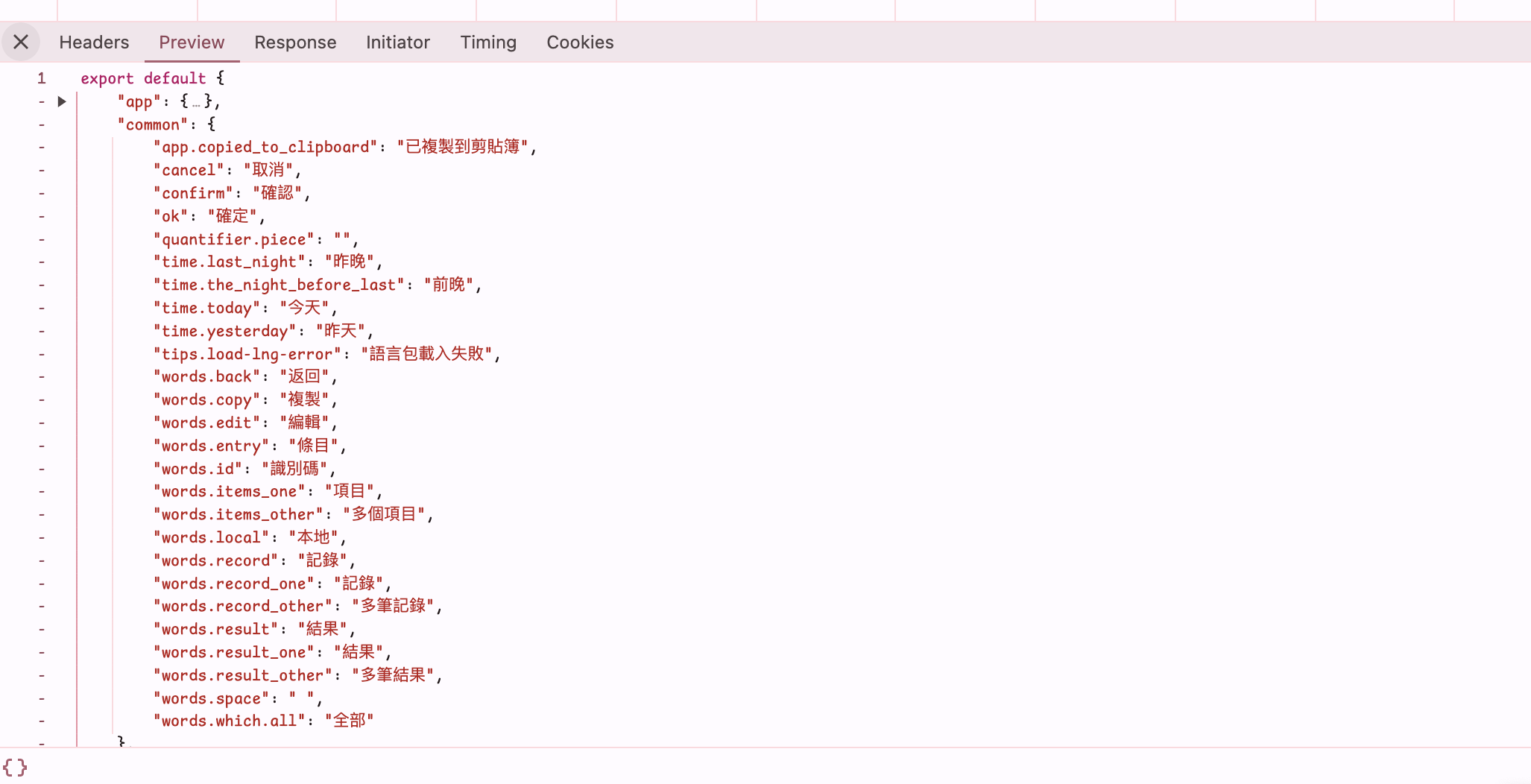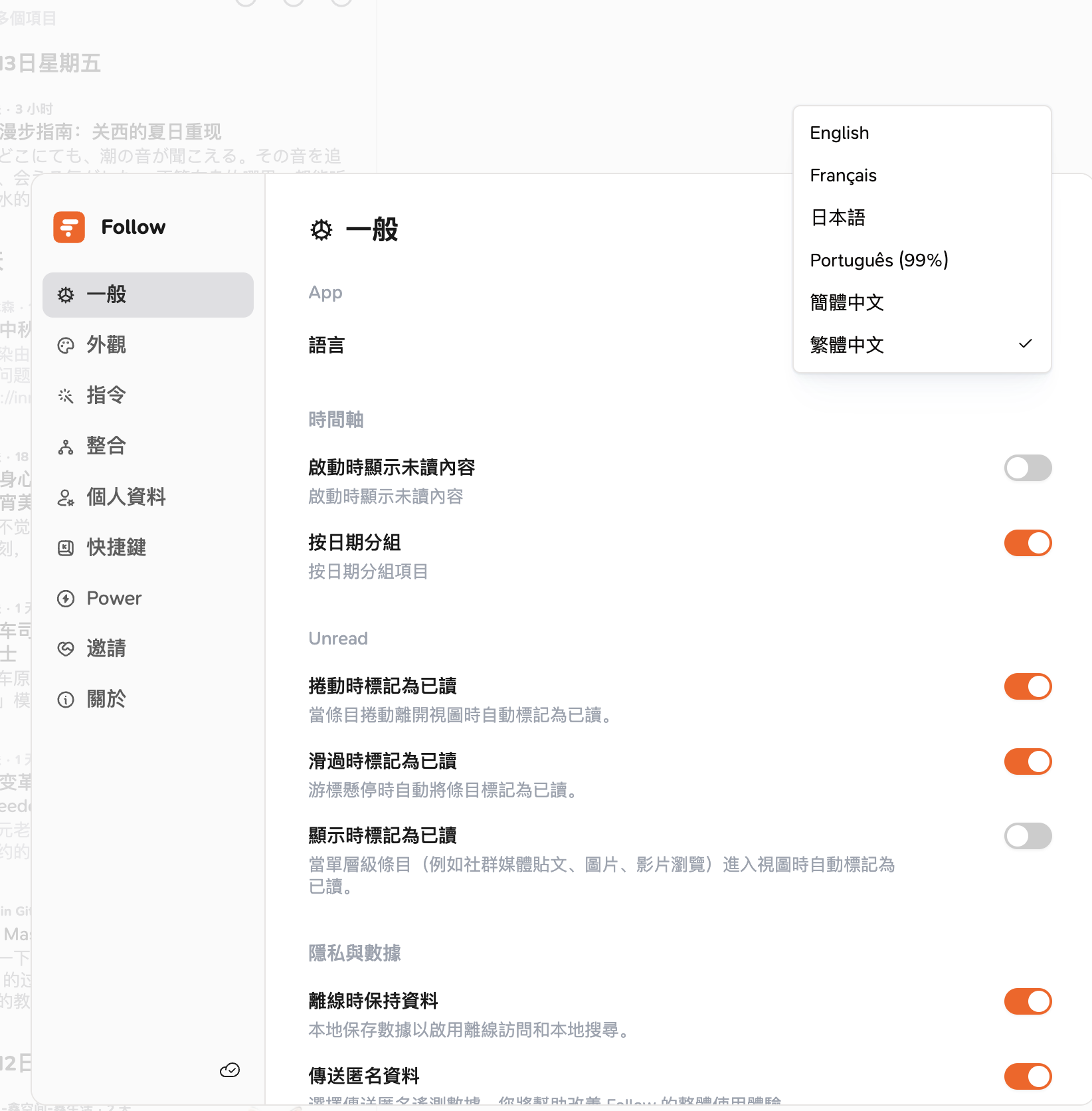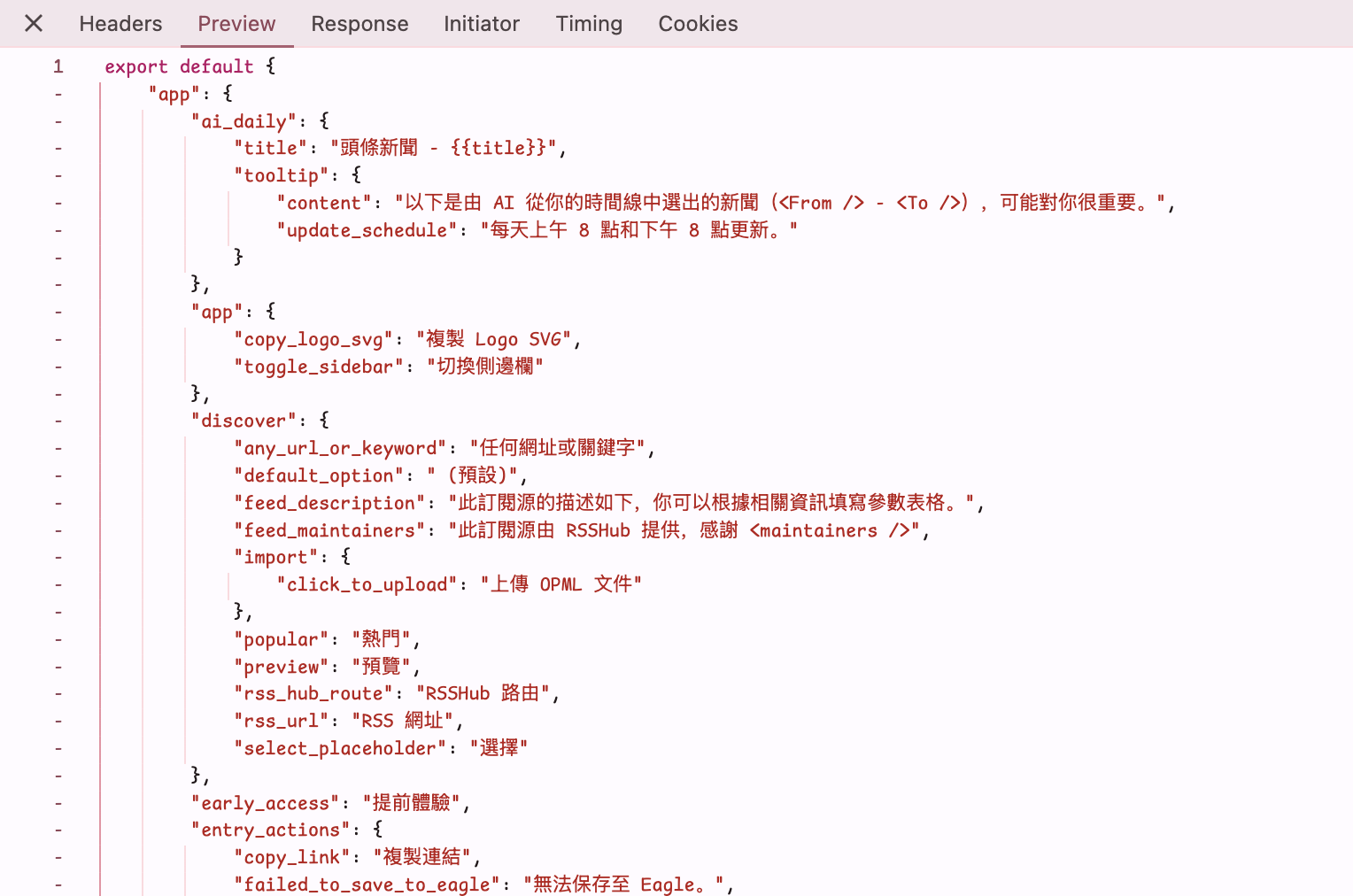最近,社区又开始给 Follow 上强度了,搞起了 i18n 工作。
开始之前有一个完善的 i18n 基建才是硬道理。我们选择 react-i18next。
接下来,我们会由浅入深去配置一个完善的 i18n 基建。
基础配置
建立一个 i18n 配置文件,比如 i18n.ts。
随后在入口文件中引入。
那么这样就可以在项目中使用 i18n 了。
解决 TypeScript 类型问题
上面的代码虽然可以正常工作,但是在 TypeScript 中,你得不到任何类型检查以及智能提示。
那么,我们希望可以有一个类型安全的写法。
我们按照官网的推荐做法,可以把 resources 放到 @types 中,然后建立 i18next.d.ts 文件。
然后修改 i18n.ts 文件。
那么现在就有类型提示。
分离 namespace
当我们项目变得越来越大,我们就会发现,如果把所有的文字都放在一个文件里,会非常难维护。因此我们需要把文字拆分到不同的文件里。也就是 namespace。
在 Follow 中,目前为止,一共拆分了以下几个 namespace:
app应用相关lang语言external外部页面settings设置shortcuts快捷键common通用
目录结构如下:
这样拆分之后,我们只需要在上面的 resources.d.ts 中引入所有的语言文件即可。
按需加载语言
当我们引入了越来越多的语言,我们就会发现,打包之后的体积也会越来越大。而用户一般只会使用一种语言,因此我们希望可以按需加载语言。
但是其实 i18next 并没有内置按需加载的逻辑,因此我们需要自己实现。首先我们需要修改 resource.ts 文件。
这里我们除了英语是全量引入之外,其他语言都是按需引入。其次删除其他语言的大部分 namespace 资源,只保留 common 和 lang 两个 namespace。由于这两个 namespace 是通用模块的,并且大小也比较小,这里可以全量引入。在实际使用场景中,你也可以完全删除。比如:
类似上面,只有一个英语的资源。现在我们可以改改文件名,resources.ts 改成 default-resources.ts。其他的不变。
接下来我们来实现如何按需加载语言。
大概的思路是:
- 通过
import()去加载需要的语言资源的,然后使用i18n.addResourceBundle()去完成加载 - 然后再次调用
i18n.changeLanguage()去切换语言 - 重新设置一个
i18next实例,让组件重新渲染
创建一个 I18nProvider 去实现这个逻辑。
然后监听 i18n 语言变化。这里注意即便是目前没有相关的语言,languageChanged 也会触发。
这里注意,当语言加载完成之后,我们还需要重新调用 i18next.changeLanguage() 去切换语言。
在生产环境中合并 namespace 资源
在上面的例子中,我们拆分了多个 namespace 资源,但是在生产环境中,我们希望可以把所有的 namespace 资源合并成一个文件,这样可以减少网络请求的次数。
我们来写一个 Vite 插件,在生产环境中,把所有的 namespace 资源合并成一个文件。
然后在 vite.config.ts 中引入。
现在,打包之后的产物中,会生成一个 locales 目录,下面包含了所有的语言资源的合并后的文件。

当然除了这个插件还不行,我们继续修改 i18n-provider.tsx 中的 langChangedHandler 方法。
区分开发环境和生产环境,在生产环境中使用 import 的方式加载语言资源,在开发环境中使用 import.meta.glob 的方式加载语言资源。
现在在生产环境中,测试切换语言,可以看到,只会请求一个文件。

动态加载日期库的 i18n
同样的,我们也要兼顾日期库的 i18n。这里以 dayjs 为例。
我们需要维护一个 Dayjs 的国际化配置的 import 表。类似:
语言代码通过:https://github.com/iamkun/dayjs/tree/dev/src/locale 获取
然后我们就可以在 langChangedHandler 中使用 dayjsLocaleImportMap 去加载对应的语言资源。
DX 优化:HMR 支持
如果我们不做任何处理,在开发环境中,当我们修改任何语言资源文件的 json,都会导致页面完全重载。而不是实时看到修改后的文字。
我们可以写一个 Vite 插件去实现 HMR。
现在当我们修改任何语言资源文件的 json,都不会导致页面完全重载,Vite 的 HMR 处理逻辑已经被我们捕获了。那么现在我们需要去手动处理他。在上面的插件中,当 json 修改,我们会发送一个 i18n-update 事件,我们可以在 i18n.ts 中处理该事件。
在 I18nProvider 中监听该事件。
计算语言翻译完成度
由于我们使用了动态加载的语言资源,那么计算语言翻译完成度不能在运行时进行了,我们需要在编译时就计算出来。
我们来写一个计算方法。
然后在 Vite 中引入这个编译宏。
在业务中使用:

扁平 Key 的处理
为了开发方便,我们一般让 i18n 的数据更加扁平。键值全部扁平处理,为了后续能够直接通过搜索找到对应的文案。
例如这样:
那么在实际业务中,按照模块去划分,这种方式会造成大量的重复前缀。
在「在生产环境中合并 namespace 资源」章节中提到,在生产中我们合并了 namespace,我们继续优化一下这个部分,让在生产中加载嵌套结构的 json 文件。
这里我们通过 lodash.set 方法让扁平数据结构转换为嵌套结构。

总结
上面我们实现了一个比较完整的 i18n 解决方案。
包括了:
- 全量引入
- 按需引入
- 动态加载
- 生产环境合并 namespace
- 计算语言翻译完成度
- HMR 支持
此方案应用于 Follow 中。
具体实现可以参考代码:
(对了,此文章中隐藏了一枚 Follow 邀请码,你能找到吗?)